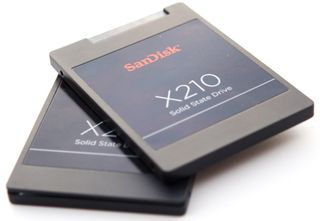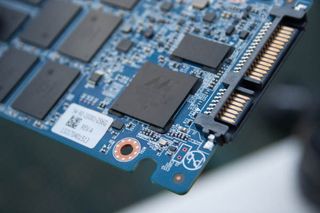SanDisk X210 256 And 512 GB: Enthusiast Speed; OEM Reliability
SanDisk's X210 SSD is both an OEM drive for major vendors and an aftermarket product for the enthusiast world. Having passed a gauntlet of validation tests, can it break into the consumer space as a true alternative to the quickest power user products?
SanDisk Creates An OEM SSD With Enthusiast Appeal
Although their attach rates are still surprisingly low, SSDs continue to evolve, allowing them to satisfy a growing number of niches. SanDisk's X210, specifically, is aimed at entry-level servers and desktop-replacement notebooks. But given the family's internals (along with extensive validation and tuning), it's really quite appropriate for most roles, except for enterprise-oriented workloads that quickly wear out the MLC flash. Purpose-built drives fare better in those more taxing applications.
Of course, SanDisk acquired SMART Storage Systems, so the company will no doubt create more hardware akin to what we reviewed in SanDisk Optimus Eco SSD: A SAS Interface And Up To 2 TB Of Flash. Really, SanDisk wants to put solid-state storage into everything. With a patent for MLC flash in one hand and a joint fabrication venture with Toshiba in the other, this organization is unlike most of the other players in that it's solely focused on flash and associated technologies.
OEM sales are where the volume happens. But products like the Ultra Plus and Extreme II matter for visibility, even if they compete for attention in the smaller aftermarket sandbox. SanDisk's X210 has one foot in both segments; it's available from select outfits to both end-users and businesses.

Although it's identical in most respects to the Extreme II, SanDisk's X210 is slightly more conservative, trading in bleeding edge specifications and the Extreme branding for firmware carefully cultivated by demanding OEM partners. To them, reliability is more important. They're responsible for supporting the systems sporting X210s after all, and they shoulder the cost of a returned machine if the SSD fails. No wonder SIs often favor tried-and-true parts.
The thing is, few manufacturers are in the business of building OEM drives. Those customers are very price-sensitive. They're also not happy when a firmware bug affects their bottom line.
Even as an enthusiast, some of the same concerns apply. I don't want some dumb issue that should have been caught killing my boot drive. That's why we tend to recommend the SSDs with which we have the best experiences, and not just the ones that tear through benchmarks quickest. I've had dozens of SSDs die on me over the years, so I don't think it's necessarily a bad idea to follow the lead of demanding OEMs when choosing a storage device.

Fortunately, when it comes to the X210, you don't make much of a sacrifice. It's almost as quick as SanDisk's Extreme II and Samsung's 840 Pro in most metrics, and the price tag isn't overly inflated. SanDisk does say it costs more to manufacture the X210, but market volatility typically masks the premium. Expect to pay less than $1/GB. Tack on five-year warranty coverage, along with the fact that there really aren't any competing OEM-derived SSDs in this performance bracket, and there's no denying the X210's attractiveness to serious client and SMB environments. Shoot, CDW sells the 512 GB model for $320. That's a phenomenal price for any high-capacity drive.
Stay on the Cutting Edge
Join the experts who read Tom's Hardware for the inside track on enthusiast PC tech news — and have for over 25 years. We'll send breaking news and in-depth reviews of CPUs, GPUs, AI, maker hardware and more straight to your inbox.
Current page: SanDisk Creates An OEM SSD With Enthusiast Appeal
Prev Page TRIM Testing: Our Suite Evolves Yet Again-
TeraMedia Is the warranty 5 years or 3? Last page says one thing, an early page says another.Decent review, decent drives. Has THG considered doing something similar to what the car mags do, where they take certain products and use them for a year? It would be great to capture that kind of longer-term info on certain types of products, especially the kind that wear out (ODDs, fans, cases, HDDs, SSDs, etc.).Reply -
Quarkzquarkz What about Samsung SSD pro 512GB? I bought 2 of these and on that chart is only 128 and 256GBReply -
vmem @vertexxthere isn't anything particularly exciting about Kaveri going by Anand's review. I shall want for the A10 version with higher clocksReply -
smeezekitty MLC with 5k write endurance!And affordable and fast?We may very well have a new solid contender in the SSD worldReply -
RedJaron I agree with Chris. I don't need the fastest bench speeds in a SSD. Most models now are very fast and the user won't see the performance difference. I want reliability and longevity. Looks like this is a smart choice for any new builder.Reply -
jake_westmorley Can we PLEASE have some normal graphs for once? The graph on page 5 in stupid 3D is so bad it's comical. The "perspective" effect completely screws with the data. This has zero added value and is almost as bad as still using clipart.Reply -
Duff165 I find it hard to believe that the author has had "literally dozens of SSd's die" on him over the years. This would suggest that many systems have contributed to the demise of many of the SSD's being used, which seems somewhat outlandish. Just the cost factor involved in the purchase of so many SSD's and then having over a dozen of them fail, supposedly also from various companies, since if they were all from the same company it would not really be conducive to good sales. One, or maybe two I could live with, but dozens? No.Reply
Most Popular

